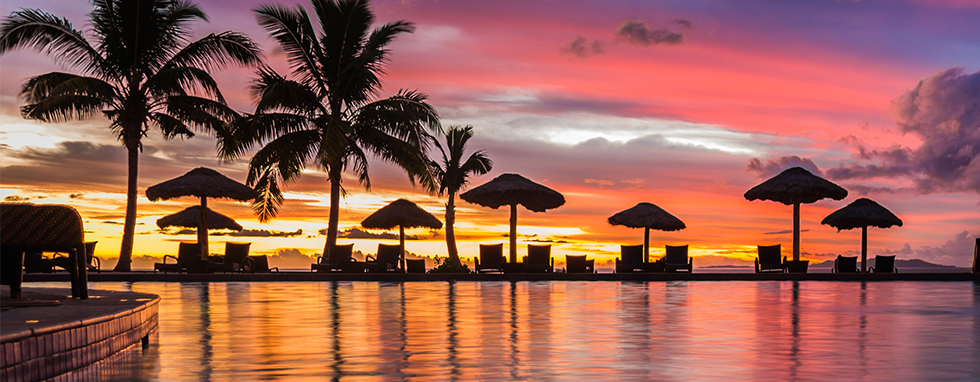Destination

The Fijian Government has implemented new entry measures. From 2 February, Fiji’s borders are closed to foreign nationals who have been in mainland China 14 days before travelling to Fiji. New measures include thermal screening at all Asian departure ports (Singapore, Hong Kong, and Tokyo) into Fiji. Other measures are medical declarations for passengers who have recently travelled to Hubei Province in China, new landing cards for all passengers, and a health check by Fijian officers on arrival.
Smartraveller hasn’t changed their level of advice: Exercise normal safety precautions in Fiji
Fiji is a tropical island paradise set in the stunning South Pacific, consisting of over 333 islands. Famous for its white sandy beaches, rugged landscapes, coral reefs and clear lagoons, the islands of Fiji perfectly represent the essence of paradise.
Attached to the mainland by a short causeway, Denarau Islands boasts eight large resorts, an 18-hole championship golf course and stunning beaches. For more information visit the Official Tourism Fiji website.
Denarau is a short 20-minute drive from Nadi International Airport, where you can hire a local taxi or rental car. Many resorts offer complimentary airport transfers.
The Fijian Dollar (FJD) is the currency of Fiji, which is made up of 100 cents. There is a 24-hour currency exchange service located at the arrivals concourse at Nadi Airport and ATMs are common in Fijian cities and at larger resorts and hotels. General banking hours are 9:30am – 4:00pm, Monday to Friday and 9:00am – 1:00pm on Saturdays. For up to date currency conversion rates see here.
Fiji has a sunny, tropical climate. With pleasant warm temperatures all year round, ocean activities can be enjoyed in all seasons. Temperatures climb during the summer months of December to April (22° to 33°C), with brief afternoon downpours, while humidity drops during the cooler months, May to November (19° to 29°C). The average temperature reaches 30°C in April
Fiji is an excellent destination for those interested in picking up handicrafts. Handicraft markets offer locally made traditional gifts from the islands including woven goods, tapa cloths, carvings, purses, fans and pottery. You’ll also find a range of shops, boutiques, supermarkets and duty-free outlets.
Located on the water’s edge, the port at Denarau offers the largest collection of quality shopping and dining in Fiji. Enjoy a shopping experience in a relaxed and exciting environment. Open from 9am – 11am daily.
Fiji’s population is approximately 837,000. English is the official language with Fijian and Hindustani also widely spoken.
The electric current in Fiji is 240 volts AC 50Hz, with three-pin power outlets (type I) – the same as Australia and New Zealand. Leading hotels offer universal outlets for shavers, hairdryers and other electrical appliances.
A 9% Government Value Added Tax (VAT) is applicable to all goods and services in Fiji. Hotels and resorts charge a Service Turnover Tax of 6% and an Environment and Climate Adaptation Levy of 10%.
Getting around Denarau Island is easy and cheap. It is certainly possible to walk around the island, however one of the most common transport options is the Denarau Shuttle (Bula Bus), which offers unique open buses for passengers to enjoy the natural warmth and views of Denarau. The cost is FJD $8 per adult for unlimited rides throughout the day.
There’s a good network of buses, carriers (trucks) and ferries for travel within Fiji’s main islands, and taxis and car hire are also common.
Bus: Buses services operate regularly out of all town centres and are a reliable and inexpensive way to get around.
Carriers and Minivans: Many locals drive small trucks (known as carriers), with a tarpaulin-covered frame on the back, or minivans. These often have passenger seating. They are quicker and slightly more expensive than a bus, but cheaper than a taxi. You can pick one up on Queens Road, Nadi’s main street.
Taxis: You can find taxi depots through the main islands and towns of Fiji. Most taxis cater to 4 passengers and luggage. Negotiating fares is acceptable, and you can also share rides.
Driving and car rental: Avis is Fiji’s leading car rental company, with Nadi International Airport operating a 24-hour service. Other rental companies include Europcar, Hertz Thrifty and Coastal Rental Cars.
Tipping is not customary or encouraged in Fiji. Tip with a smile and ‘Vinaka’ which is Fijian for ‘thank you’. Fijians ritually exchange gifts like food, clothing and money during important social occasions but it is more about the act of sharing.
